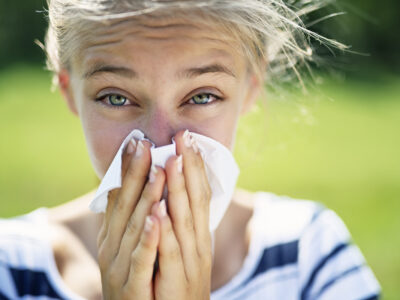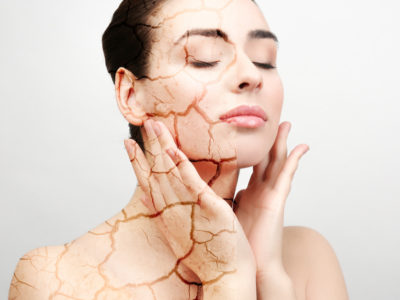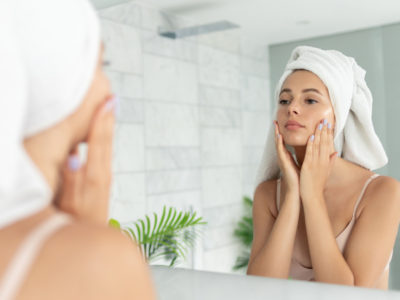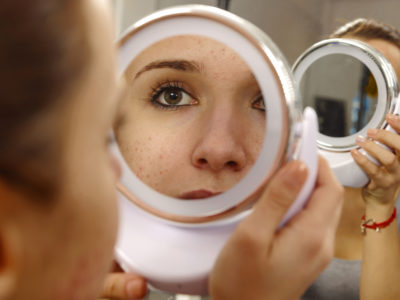Table of Contents[Hide][Show]
Scratch, scratch… itch, itch…
If you suffer from dry, itchy skin, you know how frustrating it is to try to keep yourself from scratching and rubbing at it all day. And even when you manage to keep your hands to yourself, there are times when it becomes painfully dry, red, even scaly or inflamed.
What gives?
There are plenty of reasons why you might be feeling itchy right now, and one of the main ones is eczema, a skin condition that affects a huge number of adults—and an even larger percentage of children.
But what exactly is eczema? Let’s take a look at this all-too-common skin condition, what causes it, and, most importantly, what you can do for relief.
What Is Eczema?
Eczema, also known as atopic dermatitis, is a chronic (long-lasting) condition characterized by inflammation, irritation, or redness of the skin. The result is often dry, itchy skin that gets even worse when scratched.
Eczema is an incredibly common condition, affecting roughly 31.6 million Americans—more than 10% of the population. It’s even more prevalent in children. About one in four children suffer from eczema, with the majority of them showing symptoms before their fifth birthday.
For some people, eczema goes through cycles where it improves or clears up completely (remission) and other cycles where it worsens (flares). For others, it is a persistent skin condition.
Although it can begin at any age, eczema often starts in childhood. For some eczema sufferers, it will go away as they reach puberty. Others may continue to have eczema symptoms later in life. And, less commonly, some people will first see eczema symptoms as adults.
Luckily, eczema isn’t contagious and won’t spread from person to person.
Anyone can get eczema. However, you’re more likely to suffer from eczema if:
- You have a family history of eczema, hay fever, or asthma
- You are female
Do you think you might have eczema? Here are some ways you can tell.
Eczema Symptoms
The primary symptom of eczema is itchy skin, which can be mild to severe.
The most common symptoms of eczema are found on the skin and can include:
- Red or dry patches of skin
- Thick, scaly, or hard skin
- Patches of skin that bleed or “weep” (ooze clear fluid) when scratched
The red patches that indicate eczema can be found anywhere on your body, and sometimes in multiple locations at once. Eczema flares can be in one consistent location, or they can appear in a new area each time.
There are other, less common symptoms of eczema, including:
- A Dennie-Morgan fold (an extra fold of skin under your eye)
- Darker skin beneath the eyes
- Extra skin increases on the palms of your hand or soles of your feet
Eczema has also been linked with other conditions, such as:
- Allergies, including food allergies
- Anxiety
- Asthma
- Depression
- Ichthyosis and other skin diseases
- Sleep issues
Although eczema hasn’t been proven to cause the above, researchers are exploring possible links.
Related
Fight Allergies Through Your Gut
It is almost the end of summer, which means yet another allergy season for some of us. If you find yourself scrambling to find a remedy, it may be time to look within, deep within, as in your gut. I just returned from a two-week trip to Asia and avoided Montezuma’s revenge, aka Bali belly, …
Tell-Tale Signs of Eczema
Although eczema can appear anywhere on the body, the appearance and location of eczema rashes usually varies by age.
Infants (Newborns Up to Age 2)
For infants and toddlers, the main appearance of eczema is a red rash. It may ooze if scratched.
For this group, eczema usually occurs on the:
- Face
- Scalp
- Skin located at the bend of joints (i.e. elbow or wrist) that touch other areas of skin when the joint bends.
Children (Age 2 Through Puberty)
For this age group, eczema generally appears as a thick, red rash. When scratched, it may ooze or bleed.
At this age, eczema usually appears on the:
- Ankles
- Elbows or knees (especially the bend)
- Neck
About 60% of children with eczema symptoms will outgrow it by the time they reach puberty. However, as adults, they may continue to have dry, sensitive, or easily irritated skin.
Teens and Adults (Puberty and Older)
At this point, eczema is most likely to appear as scaly rash, red to dark brown in color, that may bleed or crust when scratched.
For this age group, eczema usually appears on the:
- Ankles and feet
- Elbows and knees (especially in the bend)
- Hands
- Neck
- Skin around the eyes
For all groups, eczema symptoms are made worse by scratching or even rubbing your skin, which causes even more irritation and damage.
Complications From Eczema
In addition to the signs and symptoms we shared above, eczema can cause other conditions.
Some of the complications that often come with eczema flares include:
- Bacterial or viral skin infections. These are quite common and are made worse from scratching.
- Trouble sleeping
- Eye problems including conjunctivitis (swelling and redness inside the eyelid or the on the white of your eye) and blepharitis (inflammation and redness of the eyelid)
In addition, researchers are studying the connection between childhood eczema and the development of asthma or hay fever later in life.
Causes of Eczema
To date, researchers have been unable to pinpoint the exact causes of eczema.
However, it appears that changes in the skin barrier (the upper layer of skin, also known as the epidermis), cause it to lose moisture. The drier skin can become inflamed more easily, triggering itchy sensations. If you give into the itchiness and scratch your skin, you can cause further damage.
So what can cause the changes to your skin barrier? Here are a few triggers.
Genetic Changes (Mutations)
You’re more likely to develop eczema if there’s a history of it in your family, which indicates that it could be a genetic issue.
Researchers have recently found that there’s a specific protein that improves the skin of your health. If you’re low in this particular protein, you may experience changes to your skin barrier that lead to eczema.
Immune Issues
Certain immune issues can cause inflammation in your body, including your skin—which can lead to eczema.
Stress
Stress doesn’t directly cause eczema. However, if you already suffer from eczema, stress can bring on an eczema flare or worsen an ongoing one.
Although it’s an unavoidable part of life, there are some things you can do to lessen your stress and reduce the likelihood of it impacting your eczema.
Some stress simple stress relievers include:
- Aromatherapy (We love Amrita Aromatherapy’s 100% pure and organic essential oils.)
- Connecting with loved one
- Eating healthy foods
- Journaling
- Meditation
- Physical activity
- Practicing gratitude
- Spending time in nature
- Yoga
Related
Park Over Gym: 10 Strengthening Moves You Can Do Amidst Nature
In the Information Age, serious trainees and weekend warriors everywhere are waiting on technology to deliver the next great innovation to the doorstep of the fitness arena. With all of the bells and whistles being promoted as necessary to get ripped, shredded, and downright crazy lean, many have fallen into the “I need a gym …
Environmental Factors
Going back to the moisture barrier, there are some environmental factors that can also trigger it to change and retain less moisture, leading to eczema.
These environmental factors include:
- Air pollution
- Allergens such as dust mites, pollen, pet dander, and more
- Excessive sweating
- Extreme temperatures or humidity levels
- Food such as dairy products, eggs, nuts, and wheat
- Hormones—women are more likely to experience eczema due to hormonal levels during pregnancy or at certain points of their menstrual cycle
- Irritants such as fragrances, soaps, detergents, disinfectants, and more
- Smoke (including second-hand smoke)
Treatment for Eczema
Currently, there is no cure for eczema. Treatment consists of healing irritated or damaged skin and avoiding future episodes.
At-Home Treatments
If you’re having a mild to moderate eczema flare, here are some things you can do at home that will offer some relief and boost your overall skin health.
- Avoid very hot showers or baths
- Take lukewarm baths
- Use mild or fragrance-free soaps, shampoos, and other cleansers
- Moisturize your skin daily and immediately after showering or bathing
- Pat your skin dry with a soft towel after showering or bathing, instead of rubbing it dry
- Wear cotton and other soft fabrics
- Avoid tight clothing that rubs or scratches your skin
- Use a humidifier in dry or cold weather to increase moisture in the air
- Avoid environmental triggers, such as smoke, whenever possible
Above all, do your best to avoid rubbing or scratching your skin!
Medical Treatments
If you’re having a severe flare or experiencing major discomfort, you should see your doctor for an eczema diagnosis. They can also prescribe medications that can treat the symptoms.
One of the most common prescriptions is a topical corticosteroid cream, ointment, or gel. These can offer relief from the two main symptoms of eczema, inflammation and itchiness. While you can buy these over the counter, the prescription version is stronger and may be more effective.
Your doctor may also prescribe corticosteroids or immunosuppresants as either oral medication or an injection if topical treatments aren’t enough. However, you should only take these on a short-term basis.
And finally, if rubbing or scratching has broken the surface of your skin and led to a bacterial infection, your doctor may prescribe antibiotics.
Improving Your Gut Health
As we mentioned earlier, immune disorders can play a huge role in bringing on eczema and eczema flares.
Since about 80% of your immune system is housed in your gut, keeping your gut healthy is an important part of any eczema treatment plan.
Our favorite probiotic supplement from Just Thrive delivers beneficial bacteria 100% alive to your gut microbiome, boosting your overall gut and immune health. It’s also been proven to improve sleep and support skin health.
Final Thoughts
Is your dry, red, or itchy skin caused by eczema? Possibly. A visit to your doctor can confirm what you already suspect.
But there’s good news: depending on its cause, eczema doesn’t have to be permanent, and it can be treated.
Once you know for certain that you have eczema, follow our suggestions above to help soothe your skin and bring you fast, effective relief. Your skin will thank you!
You May Also Like…






